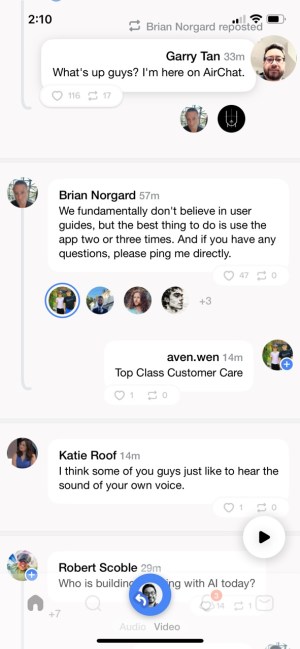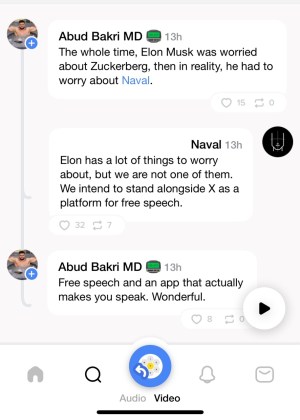Airchat is a brand new social networking app that encourages customers to “simply discuss.”
The earlier model of Airchat was launched final yr, however a staff led by AngelList founder Naval Ravikant and former Tinder product lead Brian Norgard rebuilt the app and relaunched it on iOS and Android yesterday. At the moment accessible by invitation solely, Airchat is already the twenty seventh ranked social community on the Apple App Retailer.
Visually, Airchat ought to look pretty acquainted and intuitive, with the flexibility to observe different customers, scroll via a message feed, then reply to, like, and share these messages. The distinction is that messages and replies are audio recordings which might be then transcribed by the app.
While you open Airchat, messages routinely begin taking part in and also you rapidly view them by swiping up and down. If you happen to really feel prefer it, you possibly can pause the audio and simply learn the textual content; customers may share images and movies. However audio appears to be what everybody is targeted on, and what Ravikant describes as a change in dynamics from text-based social apps.

Once I joined Airchat this morning, many of the messages I noticed have been concerning the app itself, with Ravikant and Norgard answering questions and accumulating suggestions.
“All individuals are designed to get together with different individuals, it simply takes a pure voice,” Ravikant mentioned. “On-line text-only media has given us the misunderstanding that folks can’t get together with one another, however in actuality, everybody can get alongside.”
This is not the primary time tech startups are betting on voice as the following huge factor in social media. However Airchat’s asynchronous, threaded posts create a totally completely different expertise than the stay chats which have flourished for some time on Clubhouse and Twitter Areas. Nørgaard argued that this strategy removes the stage fright barrier to participation as a result of “you possibly can attempt to compose a message right here as many occasions as you want and nobody will know.”
In actual fact, he mentioned that in conversations with early customers, the staff discovered that “most individuals utilizing AirChat right this moment are very introverted and shy.”
Personally, I haven’t satisfied myself to publish something but. I used to be extra enthusiastic about seeing how others use the app, plus I’ve a love-hate relationship with the sound of my voice.
Nevertheless, there’s something to be mentioned for listening to Ravikant and Norgard clarify their imaginative and prescient slightly than simply studying transcriptions, which can miss nuances of enthusiasm, intonation, and many others. And I am particularly curious to see how ( or not) in audio.
I additionally battle a bit with pace. By default, the app makes use of double audio playback, which I feel sounds unnatural, particularly when the entire thought is about strengthening human connections. You possibly can decelerate by holding down the pause button, however at 1x I observed that I began scrolling when listening to longer messages, after which often skipped forward earlier than listening to the complete audio. However possibly that is okay.

In the meantime, Ravikant’s religion in voice’s skill to scale back harshness does not essentially get rid of the necessity for content material moderation options. He mentioned the feed has “some sophisticated guidelines about hiding spam, trolls, and folks you or they may not wish to hear about,” however on the time of publication he had not responded to a follow-up consumer query about content material moderation. .
When requested about monetization – that’s, once we may begin seeing advertisements, audio or the rest – Ravikant mentioned that “there isn’t any stress on the corporate when it comes to monetization.” (He described himself as “not the one investor” however a “main investor” within the firm.)
“I’m much less involved about monetization,” he mentioned. “If vital, we’ll perform this factor at minimal value.”
